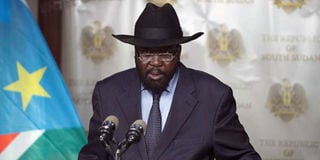One step away as South Sudan signs Maputo Protocol

South Sudan President Salva Kiir during a press briefing in Juba on July 9.He recently signed the Protocol to the African Charter on Human and Peoples’ Rights on the Rights of Women in Africa.
What you need to know:
- The protocol is among four international conventions signed into law by President Salva Kiir Mayardit recently.
- The next step is for South Sudan to deposit the instruments of ratification with the African Union’s Office of the Legal Counsel.
South Sudan has become the latest country in Africa to initiate steps towards the ratification of the Protocol to the African Charter on Human and Peoples’ Rights on the Rights of Women in Africa, commonly known as Maputo Protocol.
The protocol is among four international conventions signed into law by President Salva Kiir Mayardit recently. The next step is for South Sudan to deposit the instruments of ratification with the African Union’s Office of the Legal Counsel.
Maputo Protocol is one of the most advanced treaties on the protection of women’s and girls’ rights anywhere in the world. The new developments came following more than a decade of advocacy by the women’s movement in South Sudan and beyond.
For almost 20 years, Equality Now has been supporting women’s rights organisations under the Solidarity of African Women’s Rights (Soawr) Coalition to advocate the universal ratification of the protocol across Africa.
Soawr member Steward Women and the Coalition of Civil Society on the Ratification of Maputo Protocol in South Sudan have steered the national campaign since 2012.
Equality Now, in a statement, said its initial advocacy efforts instigated in 2012 led to the South Sudan parliament passing a motion for the ratification of the Maputo Protocol in 2014. However, the government failed to sign it, thus stalling its ratification.
In 2021, under the YW4A Initiative, the rights organisation, in partnership with other women’s rights organisations, faith-based partners, and young women advocates, intensified their advocacy of the rights of women and girls.
Mobilisation
“We engaged with high-level government policymakers, including the Ministry of Gender and Social Welfare, to advocate the ratification of the Maputo Protocol and the African Charter on the Rights and Welfare of the Child,” the lobby said in the statement.
Last year, under the YW4A Initiative and the Spotlight Initiative Africa Regional Programme, Equality Now convened civil society organisations to create and implement advocacy and movement-building strategies to promote the ratification of the protocol.
These efforts contributed to a June 2022 technical visit to South Sudan by the African Union Commission Women Gender and Youth Directorate, a partner in the Spotlight Initiative, to advocate the ratification.
During the visit, key government officials, including South Sudan’s Vice President Rebecca Nyandeng de Mabior, made statements supporting the ratification of all women’s rights treaties on gender equality and women’s rights.
The organisation noted the President’s move to ratify the protocol is a welcome step and a hallmark of the government’s commitment to gender equality.
According to Unicef, about 5.43 women and girls in South Sudan face a range of human rights violations rooted in multiple layers of violence and discrimination, including sexual abuse, harassment, intimidation, exclusion, and restrictions of movement, compounded by a lack of access to justice. Around 65 per cent of women and girls experience physical or sexual violence in their lifetime, with the most common form being abuse by husbands or partners.
For women, customary laws tend to prevail, with rape cases handled by community elders. There has also been an uproar over impunity, which lets perpetrators go scot-free, due to a weak legal system consisting of a mixture of formal and customary laws.
A total of 11 AU countries have yet to ratify the protocol. Those that have neither signed nor ratified the protocol are Botswana, Egypt and Morocco. The states that have signed but yet to ratify are Burundi, the Central African Republic, Chad, Eritrea, Madagascar, Niger, the Sahrawi Arab Democratic Republic, Somalia and Sudan.





